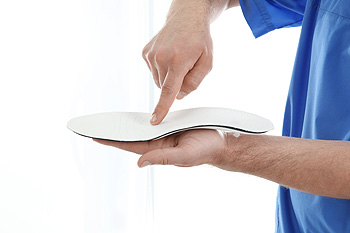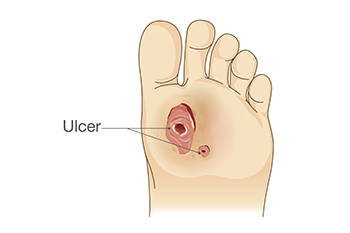
(616) 846-3400
Fax: (616) 846-3406

(616) 846-3400
Fax: (616) 846-3406

Custom-made orthotics are frequently prescribed for children to address various foot and lower limb issues. These specialized shoe inserts are tailored to each child's unique needs, correcting biomechanical imbalances and providing support where necessary. Orthotics may be needed to manage conditions like flat feet, overpronation, or foot deformities, ensuring proper alignment and preventing discomfort or injury. Involving parents in the orthotic prescription process is important for successful treatment. Educating parents about the benefits of orthotics and the importance of compliance ensures they understand their child's needs and can support treatment adherence. Follow-up appointments are critical to monitor progress, make adjustments as needed, and address any concerns. Encouraging compliance in wearing orthotics among children can be facilitated by involving them in the selection process, ensuring comfort and style preferences are considered. Additionally, positive reinforcement, praise for wearing orthotics consistently, and integrating them into daily routines can help foster acceptance and compliance. Fortunately, many children find orthotics comfortable and appreciate the support they provide for their active lifestyles. If your child has foot problems, it is suggested that you schedule an appointment with a podiatrist for diagnosis and care, in addition to discussing whether custom orthotics may provide relief.
If you are having discomfort in your feet and would like to try orthotics, contact Dr. Robbi Young from Grand Haven Foot & Ankle. Our doctor can provide the care you need to keep you pain-free and on your feet.
What Are Orthotics?
Orthotics are inserts you can place into your shoes to help with a variety of foot problems such as flat feet or foot pain. Orthotics provide relief and comfort for minor foot and heel pain but can’t correct serious biomechanical problems in your feet.
Over-the-Counter Inserts
Orthotics come in a wide variety of over-the-counter inserts that are used to treat foot pain, heel pain, and minor problems. For example, arch supports can be inserted into your shoes to help correct overarched or flat feet, while gel insoles are often used because they provide comfort and relief from foot and heel pain by alleviating pressure.
Prescription Orthotics
If over-the-counter inserts don’t work for you or if you have a more severe foot concern, it is possible to have your podiatrist prescribe custom orthotics. These high-quality inserts are designed to treat problems such as abnormal motion, plantar fasciitis, and severe forms of heel pain. They can even be used to help patients suffering from diabetes by treating foot ulcers and painful calluses and are usually molded to your feet individually, which allows them to provide full support and comfort.
If you are experiencing minor to severe foot or heel pain, it’s recommended to speak with your podiatrist about the possibilities of using orthotics. A podiatrist can determine which type of orthotic is right for you and allow you to take the first steps towards being pain-free.
If you have any questions please contact our office located in Grand Haven, MI . We offer the newest diagnostic and treatment technologies for all your foot and ankle needs.

Preventing falls among older adults is paramount to maintaining quality of life and independence. Various factors contribute to an increased risk of falls in seniors. Among them are muscle weakness, gait abnormalities, and pain. Additionally, certain health conditions like inner ear problems, vision impairment, and arthritis can negatively affect balance and mobility. Medications, such as those for blood pressure and sleep disorders, can induce side effects that increase susceptibility to falls. Through comprehensive assessments and evaluations, a podiatrist can tailor interventions to reduce fall risks. These may involve strength, gait, and balance tests, blood pressure monitoring and vision assessments. Incorporating balance exercises and strength training into daily routines can significantly enhance mobility and stability, thereby reducing the likelihood of falls. Activities targeting core and leg muscles are particularly beneficial, as they play a vital role in maintaining balance and coordination. Using assistive devices, such as canes, walkers or wheelchairs, can provide additional support and safety for individuals with mobility limitations. If you are a senior and have fallen recently or experience balance problems, it is suggested that you schedule an appointment with a podiatrist for a thorough exam to determine what the reason is.
Preventing falls among the elderly is very important. If you are older and have fallen or fear that you are prone to falling, consult with Dr. Robbi Young from Grand Haven Foot & Ankle. Our doctor will assess your condition and provide you with quality advice and care.
Every 11 seconds, an elderly American is being treated in an emergency room for a fall related injury. Falls are the leading cause of head and hip injuries for those 65 and older. Due to decreases in strength, balance, senses, and lack of awareness, elderly persons are very susceptible to falling. Thankfully, there are a number of things older persons can do to prevent falls.
How to Prevent Falls
Some effective methods that older persons can do to prevent falls include:
Falling can be a traumatic and embarrassing experience for elderly persons; this can make them less willing to leave the house, and less willing to talk to someone about their fears of falling. Doing such things, however, will increase the likelihood of tripping or losing one’s balance. Knowing the causes of falling and how to prevent them is the best way to mitigate the risk of serious injury.
If you have any questions, please feel free to contact our office located in Grand Haven, MI . We offer the newest diagnostic and treatment technologies for all your foot care needs.

Non-healing foot ulcers in diabetic patients are influenced by a myriad of factors, including the wound environment, the patient's general health, and the medications they are taking. A compromised wound environment, often characterized by high bacterial load, excess moisture, or inadequate blood supply due to peripheral arterial disease, can impede healing. Additionally, the patient's overall health status plays a significant role, with conditions like obesity, smoking, and immune system deficiencies hindering the body's ability to repair tissues. Medications such as corticosteroids and certain chemotherapeutic agents may also interfere with wound healing processes. Addressing these multifaceted challenges requires a comprehensive approach, encompassing wound debridement, infection control, and optimizing the patient's general health through lifestyle modifications and medication adjustments. If you suffer from diabetic foot ulcers, it is strongly suggested that you are under a podiatrist to enhance healing outcomes and reduce the risk of serious complications.
Wound care is an important part in dealing with diabetes. If you have diabetes and a foot wound or would like more information about wound care for diabetics, consult with Dr. Robbi Young from Grand Haven Foot & Ankle. Our doctor will assess your condition and provide you with quality foot and ankle treatment.
What Is Wound Care?
Wound care is the practice of taking proper care of a wound. This can range from the smallest to the largest of wounds. While everyone can benefit from proper wound care, it is much more important for diabetics. Diabetics often suffer from poor blood circulation which causes wounds to heal much slower than they would in a non-diabetic.
What Is the Importance of Wound Care?
While it may not seem apparent with small ulcers on the foot, for diabetics, any size ulcer can become infected. Diabetics often also suffer from neuropathy, or nerve loss. This means they might not even feel when they have an ulcer on their foot. If the wound becomes severely infected, amputation may be necessary. Therefore, it is of the upmost importance to properly care for any and all foot wounds.
How to Care for Wounds
The best way to care for foot wounds is to prevent them. For diabetics, this means daily inspections of the feet for any signs of abnormalities or ulcers. It is also recommended to see a podiatrist several times a year for a foot inspection. If you do have an ulcer, run the wound under water to clear dirt from the wound; then apply antibiotic ointment to the wound and cover with a bandage. Bandages should be changed daily and keeping pressure off the wound is smart. It is advised to see a podiatrist, who can keep an eye on it.
If you have any questions, please feel free to contact our office located in Grand Haven, MI . We offer the newest diagnostic and treatment technologies for all your foot care needs.
 Diabetic foot ulcers are a serious concern for people with diabetes, as they can lead to severe complications. These ulcers form due to a combination of poor circulation, nerve damage, and impaired wound-healing capabilities, all common in diabetics. To lower the risk of complications, it's important to manage blood sugar levels diligently, as high glucose can further impair healing. Regular inspections of the feet for any cuts, bruises, or changes are essential to catch problems early. Making regular appointments with a podiatrist, or foot doctor, can help with this process. Wearing properly fitting shoes and avoiding walking barefoot can also prevent injuries. If an ulcer does develop, it is important to seek immediate medical attention to treat the wound and any infections. Maintaining cleanliness, applying appropriate dressings, and possibly using antibiotics are typical steps in managing foot ulcers. If you are diabetic and at risk for developing foot ulcers, it is suggested that you add a podiatrist to your care team.
Diabetic foot ulcers are a serious concern for people with diabetes, as they can lead to severe complications. These ulcers form due to a combination of poor circulation, nerve damage, and impaired wound-healing capabilities, all common in diabetics. To lower the risk of complications, it's important to manage blood sugar levels diligently, as high glucose can further impair healing. Regular inspections of the feet for any cuts, bruises, or changes are essential to catch problems early. Making regular appointments with a podiatrist, or foot doctor, can help with this process. Wearing properly fitting shoes and avoiding walking barefoot can also prevent injuries. If an ulcer does develop, it is important to seek immediate medical attention to treat the wound and any infections. Maintaining cleanliness, applying appropriate dressings, and possibly using antibiotics are typical steps in managing foot ulcers. If you are diabetic and at risk for developing foot ulcers, it is suggested that you add a podiatrist to your care team.
Diabetic foot care is important in preventing foot ailments such as ulcers. If you are suffering from diabetes or have any other concerns about your feet, contact Dr. Robbi Young from Grand Haven Foot & Ankle. Our doctor can provide the care you need to keep you pain-free and on your feet.
Diabetic Foot Care
Diabetes affects millions of people every year. The condition can damage blood vessels in many parts of the body, especially the feet. Because of this, taking care of your feet is essential if you have diabetes, and having a podiatrist help monitor your foot health is highly recommended.
The Importance of Caring for Your Feet
Patients with diabetes should have their doctor monitor their blood levels, as blood sugar levels play such a huge role in diabetic care. Monitoring these levels on a regular basis is highly advised.
It is always best to inform your healthcare professional of any concerns you may have regarding your feet, especially for diabetic patients. Early treatment and routine foot examinations are keys to maintaining proper health, especially because severe complications can arise if proper treatment is not applied.
If you have any questions please feel free to contact our office located in Grand Haven, MI . We offer the newest diagnostic and treatment technologies for all your foot and ankle needs.